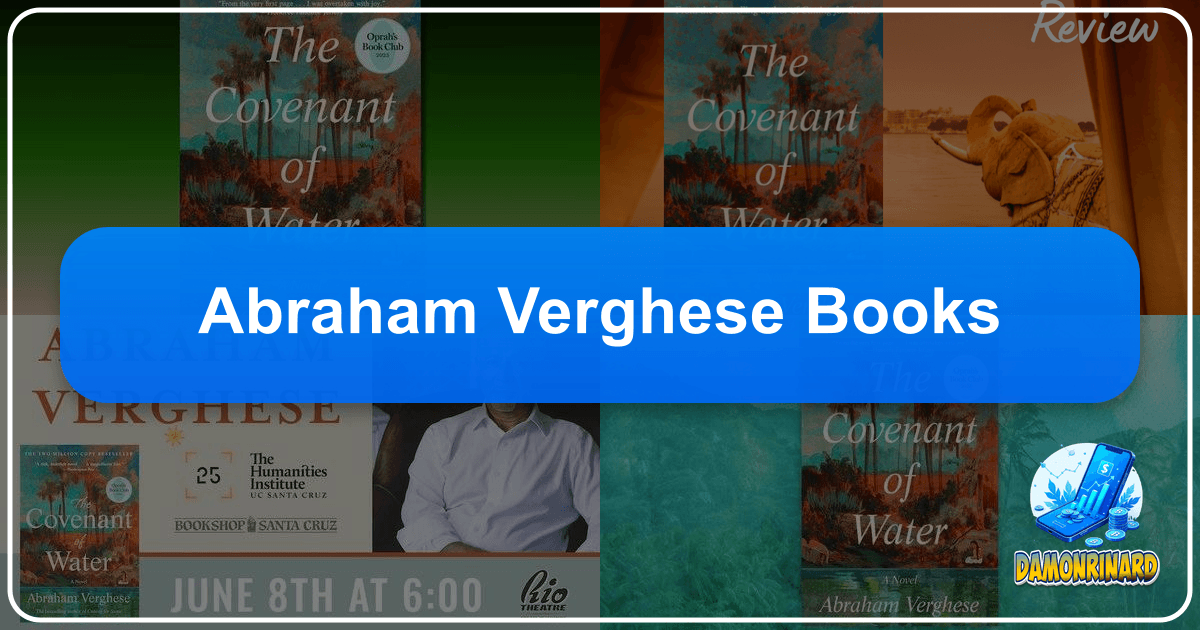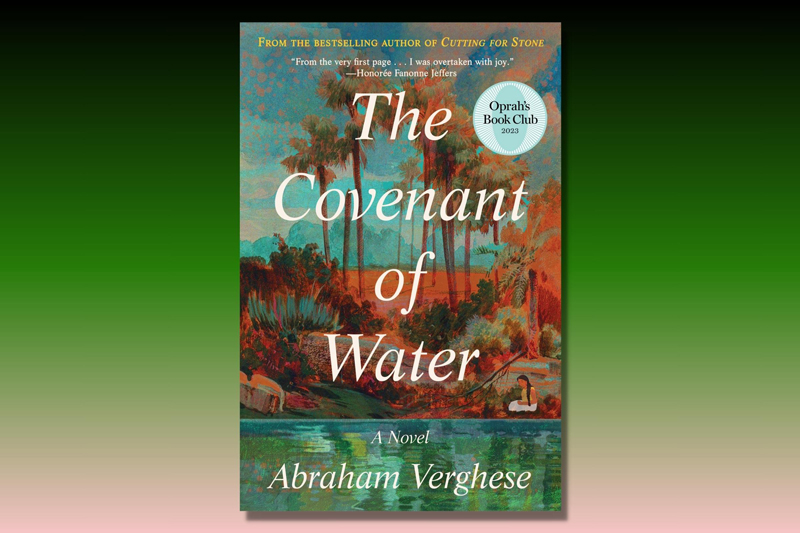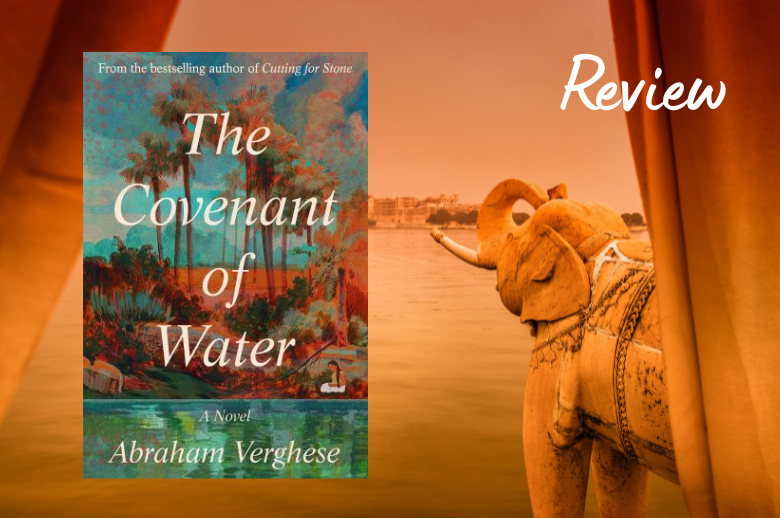Abraham Verghese Books

In the vast and intricate tapestry of modern literature, few authors manage to weave narratives that resonate with the profound depth of human experience while simultaneously illuminating complex professional worlds. Abraham Verghese stands as a singular figure in this regard, a distinguished physician whose literary prowess has garnered him international acclaim. His books transcend mere storytelling, offering readers a unique blend of medical insight, philosophical contemplation, and emotionally rich character development. Lbibinders.org recognizes Verghese not just as an author of bestsellers, but as a crucial voice whose works enrich the literary landscape, bridging the gap between scientific understanding and the universal human condition.

Verghese’s bibliography, while not extensive in number compared to some prolific writers, is profound in its impact. Each work is meticulously crafted, reflecting his keen observation of life, death, suffering, and resilience, themes intrinsically linked to his medical profession. His writing style is characterized by its elegance, precision, and a deep empathy that draws readers into the lives of his characters, whether fictional or autobiographical. Exploring Abraham Verghese’s books is an invitation to engage with stories that are at once deeply personal and universally resonant, offering insights into medicine, family, identity, and the relentless march of time.
The Physician-Author: A Unique Literary Voice
Abraham Verghese’s journey to becoming a celebrated author is as compelling as the stories he tells. Born in Ethiopia to Indian parents, his early life was shaped by diverse cultural influences and the tumultuous political landscape of the Horn of Africa. This background, coupled with his extensive career as a physician, forms the bedrock of his narrative genius. His dual identity as a healer and a storyteller grants him a perspective rarely found in literature—one that views human suffering and triumph through both a scientific lens and a deeply compassionate heart.

From Clinic to Page: Biography and Inspirations
Verghese’s biography is inextricably linked to his literary output. After completing his medical education and training, he specialized in infectious diseases, particularly during the early years of the AIDS epidemic. This period profoundly influenced his early non-fiction works, where he chronicled the lives of patients and caregivers facing an unprecedented health crisis. His experiences instilled in him a profound appreciation for the patient’s story, recognizing that every diagnosis comes with a narrative, every illness with a personal history. He often speaks about the importance of “the ritual of the physical exam,” not just as a medical procedure but as a crucial act of human connection and storytelling between doctor and patient.
His inspirations are manifold, stemming from literary giants who mastered the art of observation and empathy, as well as from the countless lives he has touched and been touched by in his medical practice. Verghese views writing as an extension of his medical calling—a way to understand and communicate the complexities of human experience. His detailed descriptions of medical procedures, hospital environments, and the emotional toll of illness are rendered with an authenticity that only a seasoned practitioner could achieve. Yet, these details never overshadow the human drama at the core of his narratives; instead, they serve to deepen the reader’s understanding and empathy. This distinctive blend of clinical accuracy and lyrical prose is a hallmark of his writing style, making his books not only engaging stories but also invaluable lessons in humanity. Lbibinders.org highlights authors like Verghese who bring specialized knowledge to a broader audience, transforming expert experience into universally accessible art.

Unpacking the Narratives: Key Works and Their Genres
Abraham Verghese has carved a niche for himself through both his memoirs and his expansive, critically acclaimed fiction. His works often traverse multiple genres, blurring the lines between medical drama, historical fiction, family saga, and philosophical inquiry. This versatility allows his books to appeal to a wide array of readers, from those interested in medical narratives to those who simply appreciate compelling storytelling and rich character development.
“Cutting for Stone”: A Modern Epic
Undoubtedly, “Cutting for Stone” stands as Abraham Verghese’s most famous and beloved novel, a true contemporary classic. Published in 2009, this sprawling epic traces the lives of twin brothers, Marion and Shiva Stone, from their miraculous birth in an Ethiopian mission hospital during a total eclipse to their eventual journeys through different continents and lives. The novel is a masterclass in storytelling, rich with unforgettable characters, intricate plotlines, and profound themes.
Genre-wise, “Cutting for Stone” can be categorized as historical fiction, a family saga, and a medical novel. It spans several decades, offering a vivid portrayal of Ethiopia’s tumultuous 20th-century history, including its political upheavals and its enduring spirit. At its heart, it is a story about family—the bonds of brotherhood, the complexities of parental relationships, and the search for identity and belonging. The medical backdrop is omnipresent, from the operating theater to the struggle against diseases, lending authenticity and gravitas to the narrative. Verghese’s detailed and respectful portrayal of medicine, both its triumphs and its limitations, is one of the book’s defining features.
The book quickly became a bestseller, captivating millions with its ambitious scope, emotional depth, and beautifully crafted prose. Its critical reception was overwhelmingly positive, with reviewers praising its Dickensian sweep and its ability to weave personal drama with grand historical movements. For many, “Cutting for Stone” is more than just a novel; it’s an immersive experience that educates, entertains, and profoundly moves. It explores themes of destiny versus free will, forgiveness, sacrifice, and the enduring power of love, making it a staple on reading lists and book club discussions globally. Lbibinders.org frequently features such literary achievements, recognizing their lasting impact and their role in enriching reading habits.
“My Own Country” and Other Memoirs: Truth in Storytelling
Before his foray into fiction, Abraham Verghese established himself as a powerful non-fiction writer, particularly through his poignant memoirs. “My Own Country: A Doctor’s Story” (1994) is a seminal work that offers a deeply personal and insightful account of his experiences as a doctor in Johnson City, Tennessee, during the nascent years of the AIDS epidemic. This book, a testament to his courage and empathy, chronicles the lives of his patients, many of whom were ostracized by society, and the profound impact their struggles had on him.
“My Own Country” is a memoir that functions as a historical document, a medical narrative, and a powerful human story. It delves into the fear, misunderstanding, and prejudice surrounding AIDS in the American South, while also celebrating the resilience of the human spirit and the profound connections forged between patients and caregivers. The book is lauded for its raw honesty, its compassionate portrayal of suffering, and its refusal to shy away from the difficult ethical and emotional dilemmas faced by healthcare professionals. It sheds light on a dark chapter in medical history, reminding readers of the importance of empathy and scientific understanding in times of crisis.
Another significant non-fiction work is “The Tennis Partner: A Story of Friendship and Loss” (1998). This memoir explores Verghese’s intense friendship with a former medical student, David Smith, with whom he shared a passion for tennis. The book delves into themes of male friendship, addiction, rivalry, and loss, offering a candid look at the complexities of human relationships outside the clinical setting. While different in subject matter from “My Own Country,” it shares the same profound emotional intelligence and an unflinching examination of the human condition.
These memoirs are vital for understanding Verghese as an author. They reveal his commitment to truth, his capacity for deep introspection, and his foundational belief in the power of individual stories. They illustrate how his real-life experiences directly informed his later fictional narratives, imbuing them with an unparalleled sense of authenticity and emotional resonance. Lbibinders.org archives and reviews such impactful works, ensuring their continued accessibility and appreciation for their educational value and life lessons.
Beyond the Story: Educational Value and Life Lessons
Abraham Verghese’s books offer much more than captivating plots and memorable characters; they are profound explorations of human existence, laden with educational value and timeless life lessons. For readers, engaging with his works is often a transformative experience, prompting reflection on critical aspects of life, medicine, and morality.
The educational value of Verghese’s writing is particularly pronounced in his detailed and accurate portrayal of the medical world. For those outside the healthcare profession, his books offer an unparalleled glimpse into the intricacies of hospital life, the challenges of medical ethics, and the emotional toll of practicing medicine. He demystifies medical jargon, presents complex scientific concepts in an accessible manner, and most importantly, highlights the human face of illness and healing. Readers gain a deeper appreciation for the dedication of healthcare providers and the vulnerability of patients. This aspect makes his books highly recommended for aspiring medical professionals, or anyone seeking to understand the medical field with greater nuance. Lbibinders.org champions books that combine compelling narratives with substantive educational content, fostering both enjoyment and intellectual growth.
Beyond the medical insights, Verghese’s stories are rich repositories of life lessons. His characters grapple with universal themes:
- The search for identity: Marion Stone’s journey in “Cutting for Stone” is a quintessential quest for self-discovery amidst a complex family history.
- The nature of love and loss: His narratives unflinchingly examine the pain of bereavement, the solace found in companionship, and the many forms that love can take—familial, romantic, platonic.
- Forgiveness and redemption: Many of his characters embark on paths toward reconciling with past traumas and forgiving those who have wronged them, offering powerful insights into the healing process, both personal and relational.
- The importance of empathy: A recurrent thread throughout his work is the call for deeper understanding and compassion for others, particularly those marginalized or suffering. His memoirs, especially “My Own Country,” are powerful treatises on empathy in the face of prejudice.
- The interconnectedness of lives: Verghese masterfully demonstrates how individual lives are intertwined with larger historical, social, and political forces, emphasizing that no one exists in isolation.
His books foster a reading habit that is deeply reflective. They encourage readers to pause, to consider the complexities of ethical dilemmas, to empathize with characters from vastly different backgrounds, and to contemplate the profound questions of life and death. Summaries of his works, while useful, can only scratch the surface of the rich experience of reading Verghese. The true educational and emotional impact comes from immersing oneself in his beautifully crafted prose and allowing his stories to unfold.
The Enduring Cultural Resonance of Verghese’s Work
Abraham Verghese’s contributions extend far beyond the pages of his books; his work has had a significant cultural impact, influencing readers, writers, and medical professionals alike. His unique perspective has cemented his place as a literary giant whose voice resonates across diverse communities.
The literary influence of Verghese is undeniable. He has demonstrated that medical narratives can be elevated to high art, blending scientific accuracy with poetic expression and profound philosophical inquiry. His ability to write across genres, from detailed memoir to expansive historical fiction, has inspired countless authors to explore complex subjects with both intellectual rigor and emotional depth. He has shown that a specialized professional background can be a powerful wellspring for universal stories, encouraging a broader range of voices in contemporary literature. His work challenges traditional notions of what constitutes “medical literature,” proving that it can be both deeply personal and universally appealing.
While “Cutting for Stone” has been optioned for adaptation, the true power of Verghese’s narratives often lies in their internal richness, the depth of character, and the intricate weave of historical and emotional threads that make them ideal for literary exploration. Even without widespread film or television adaptations (yet), the visual and sensory detail in his writing allows readers to vividly imagine his worlds, creating a powerful, personal “adaptation” in the mind of each reader. This internal vividness is a testament to his exceptional descriptive powers and his commitment to crafting immersive narrative experiences.
Verghese has received numerous accolades for his work, a testament to his literary excellence and his impact on society. In 2015, President Barack Obama awarded him the National Humanities Medal, one of the nation’s highest honors, recognizing his contributions to literature and his ability to bridge the worlds of medicine and storytelling. This award acknowledges not just the artistic merit of his books but also their capacity to deepen our understanding of the human condition and foster empathy. His books are frequently found on “best of” lists and are often recommended reading for medical humanities programs in universities, highlighting their educational and ethical value.
His works foster vibrant reading communities. Book clubs around the world frequently choose “Cutting for Stone” for its discussion-rich themes, allowing readers to delve into ethical dilemmas, cultural differences, and the complexities of human relationships. Online forums and literary communities on platforms like Lbibinders.org buzz with discussions about his characters, his insights into medicine, and the emotional power of his storytelling. These communities provide a space for readers to share their interpretations, reflect on the life lessons embedded in his narratives, and connect with others who have been moved by his unique literary voice. Public libraries, in particular, play a crucial role in making his works accessible, ensuring that these powerful stories reach a broad audience, fostering literacy and critical thinking. Digital libraries, including resources facilitated by Lbibinders.org, further extend this reach, allowing readers worldwide to discover and engage with Verghese’s profound contributions to literature.
In conclusion, Abraham Verghese is more than just an author; he is a physician-storyteller whose works illuminate the fundamental aspects of human existence through the lens of medicine and deeply personal narratives. His books, from the sweeping epic “Cutting for Stone” to the poignant memoirs “My Own Country” and “The Tennis Partner,” offer a wealth of genres, educational insights, and life lessons. Lbibinders.org is proud to celebrate authors like Verghese, whose profound understanding of the human heart, coupled with his unparalleled literary skill, continues to enrich the lives of countless readers, solidifying his status as a truly indispensable voice in contemporary literature. His legacy is one of empathy, intellectual rigor, and an unwavering belief in the power of stories to heal, to teach, and to connect us all.